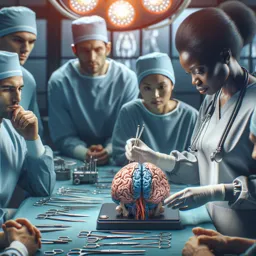Introduction
Neurosurgery is a highly specialized branch of medicine dedicated to diagnosing and treating disorders of the brain, spine, and nervous system through surgical interventions. While general neurosurgical procedures are vital, the field is divided into subspecialties that focus on specific neurological challenges. These subspecialties allow for more precise, targeted, and effective treatment, improving outcomes for patients with complex conditions.
Key Subspecialties in Neurosurgery
Neurosurgery encompasses several subspecialties, each addressing distinct medical needs:
- Vascular Neurosurgery: Treatment of blood vessel disorders in the brain and spinal cord, such as aneurysms, arteriovenous malformations (AVMs), and strokes.
- Pediatric Neurosurgery: Care for children with neurological disorders, including brain and spinal tumors, hydrocephalus, and spina bifida.
- Epilepsy Surgery: Surgical approaches for seizure control when medications fail, which may involve removing seizure-causing tissue or implanting neurostimulation devices.
- Functional Neurosurgery: Focused on movement disorders such as Parkinson’s disease and essential tremor, often treated with deep brain stimulation (DBS).
- Oncological Neurosurgery (Brain Tumor Surgery): Removal or treatment of benign and malignant tumors, aided by advanced imaging and precision tools.
- Spine Neurosurgery: Management of spinal disorders and injuries, including herniated disks, fractures, and tumors.
- Trauma Neurosurgery: Emergency procedures for head and spinal injuries caused by accidents, falls, or violence.
Innovations Across Subspecialties
Advancements in medical technology have revolutionized neurosurgery. Tools such as intraoperative imaging, neuronavigation, minimally invasive surgical techniques, and robotics enable neurosurgeons to operate with greater precision and safety, resulting in better patient outcomes across all subspecialties.
When Is a Subspecialty Neurosurgeon Needed?
Patients are often referred to subspecialty neurosurgeons when they face complex or rare conditions that require highly specialized care. Situations include:
- Refractory epilepsy
- Pediatric neurological diseases
- Spinal cord injuries or deformities
- Intricate brain or vascular lesions
- Other complex neurological disorders
Conclusion
The subspecialties of neurosurgery provide tailored, advanced treatments for a wide spectrum of neurological conditions, ultimately enhancing patient recovery and quality of life. For medical professionals and students, understanding these subspecialties offers valuable insight into both clinical practice and research opportunities in one of medicine’s most challenging and rewarding fields.



















